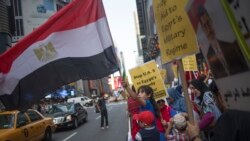CAIRO —
A high-ranking Russian delegation arrives in Egypt Wednesday, a visit suggesting a possible shift in alliances as tensions between Egypt and the United States grow. But some analysts believe that if Egypt expands its foreign relations, it could be a boon to everyone involved.
Russian Foreign Minister Sergei Lavrov's and Defense Minister Sergei Shoigu's mission in Cairo is to boost economic, political and security ties.
The visit comes as relations between Egypt and its long time ally, the United States, appear at a crossroads, with Washington cutting aid after the military ouster of President Mohamed Morsi.
The prospect of Egypt shifting its allegiance has revived memories of the height of Moscow-Cairo ties.
The Cold War alliance brought Egypt a massive infusion of military hardware, improvement of infrastructure, and the Aswan Dam, a huge leap for the previously-energy hungry nation.
But in the 1970's, amid crippling debt and a peace push from the U.S over Cairo's relations with Israel, Egypt switched sides.
Fresh ties with Moscow comes as many Egyptians, in a wave of neo-nationalism, are chafing at being perceived as Washington's errant junior partner. Mai Wahba, spokeswoman for the activist group Tamarod, said not only Russia but China and others could all be possible allies.
She said Egypt won't lean toward one side or the other, but "whoever respects the will of the Egyptian nation will be respected by us."
But the U.S. rift can be deceptive. Washington has maintained cooperation in key areas, such as counterterrorism, and security in the Sinai Peninsula.
Moreover, says political analyst Hisham Kassem, talk of billion dollar arms deals with Russia makes no sense in a country that already has more weapons than it needs. "If such a deal was [to go] through, and I'm positive it's not, it would really mean arms in warehouses. There is no use for them," he added.
Kassem also dismisses talk of a Russian sea base in Egypt, should Moscow lose its only Mediterranean port in war-torn Syria. Even the Americans, he noted, were unable to get such a deal.
Egyptian officials are also downplaying any strategic realignment. "I see relations with Russia expanding considerably, being diversified in as many ways as possible. But I don't see them as an alternative to anybody else," said Foreign Minister Nabil Fahmy.
And some say that is a good thing.
"It could be very productive for everybody, including the United States, if Egypt is to play its role in diplomacy again. A situation like the Syrian crisis could have been handled much better," Kassem explained. "Instead of finding ourselves irrelevant and unable to contribute in any way to that."
Kassem believes an Egypt with greater regional and international ties will help it regain its footing as an important - and useful - regional player.
Russian Foreign Minister Sergei Lavrov's and Defense Minister Sergei Shoigu's mission in Cairo is to boost economic, political and security ties.
The visit comes as relations between Egypt and its long time ally, the United States, appear at a crossroads, with Washington cutting aid after the military ouster of President Mohamed Morsi.
The prospect of Egypt shifting its allegiance has revived memories of the height of Moscow-Cairo ties.
The Cold War alliance brought Egypt a massive infusion of military hardware, improvement of infrastructure, and the Aswan Dam, a huge leap for the previously-energy hungry nation.
But in the 1970's, amid crippling debt and a peace push from the U.S over Cairo's relations with Israel, Egypt switched sides.
Fresh ties with Moscow comes as many Egyptians, in a wave of neo-nationalism, are chafing at being perceived as Washington's errant junior partner. Mai Wahba, spokeswoman for the activist group Tamarod, said not only Russia but China and others could all be possible allies.
She said Egypt won't lean toward one side or the other, but "whoever respects the will of the Egyptian nation will be respected by us."
But the U.S. rift can be deceptive. Washington has maintained cooperation in key areas, such as counterterrorism, and security in the Sinai Peninsula.
Moreover, says political analyst Hisham Kassem, talk of billion dollar arms deals with Russia makes no sense in a country that already has more weapons than it needs. "If such a deal was [to go] through, and I'm positive it's not, it would really mean arms in warehouses. There is no use for them," he added.
Kassem also dismisses talk of a Russian sea base in Egypt, should Moscow lose its only Mediterranean port in war-torn Syria. Even the Americans, he noted, were unable to get such a deal.
Egyptian officials are also downplaying any strategic realignment. "I see relations with Russia expanding considerably, being diversified in as many ways as possible. But I don't see them as an alternative to anybody else," said Foreign Minister Nabil Fahmy.
And some say that is a good thing.
"It could be very productive for everybody, including the United States, if Egypt is to play its role in diplomacy again. A situation like the Syrian crisis could have been handled much better," Kassem explained. "Instead of finding ourselves irrelevant and unable to contribute in any way to that."
Kassem believes an Egypt with greater regional and international ties will help it regain its footing as an important - and useful - regional player.





